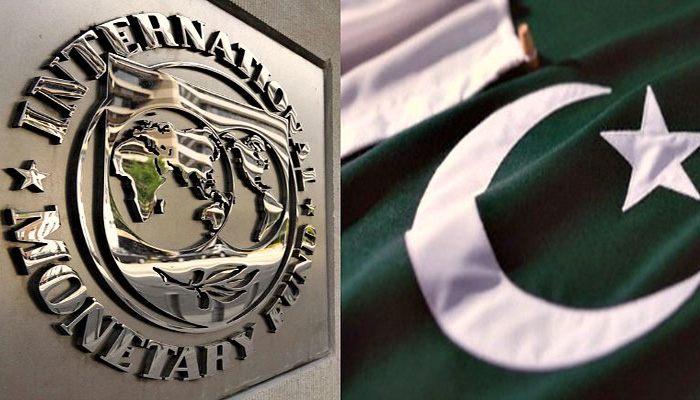‘IMF’s bailout package not viable for economy’
KARACHI: The Finance Ministry is drawing up a plan to seek another bailout package from the International Monetary Fund (IMF) and present the option to the next prime minister once he assumes the office, which is not viable for Pakistan ecnonomy, said Ahmad Jawad, former chairman of the standing committee of the FPCCI.
In a statement, Jawad said that the next government should avoid international borrowing to run the government affairs like it was done in the past. If borrowing is much required from the IMF or World Bank, then it should be project-based only like upgradation of the transmission lines of the power distribution companies (Discos), building of water dams, so that it could be beneficial for the public, he said.
Jawad said that the next government should restructure the agricultural policies, provide incentives to industry, offer less duties on raw materials, which will give relief to the dwindling ecnonomy of the country.
The upcoming government needs to enhance exports, provide due relaxation to international investors, including overseas Pakistanis and restructuring the remittance system for the economical revival of Pakistan.
Pakistan Tehreek-e-Insaf (PTI) Chairman Imran Khan, who is likely to be the next prime minister, must reform agriculture policies and provide incentives for value addition to the private sector for the ultimate viability of the economic system, he suggested.
Forecasts suggests in 2018 Pakistan’s GDP will not grow more than 5 percent, he said, adding that in 2017, the country's per capita GDP grew 3.6 percent – lower than that of India and Bangladesh.
The country’s labour participation rates are abysmal. It ranks 147th in the Ease of Doing Business Index. Khan plans to train two million youth within two years of coming to power. And to create more jobs for Pakistanis, he has outlined increasing investment spending to more than 21 percent of GDP. In 2016, the investment spending was around 11 percent of the GDP, Jawad said.
-
 Dax Shepard Describes 'peaceful' Feeling During Near-fatal Crash
Dax Shepard Describes 'peaceful' Feeling During Near-fatal Crash -
 Steve Martin Says THIS Film Has His Most Funny Scene
Steve Martin Says THIS Film Has His Most Funny Scene -
 Kensington Palace Shares Update As Prince William Continues Saudi Arabia Visit
Kensington Palace Shares Update As Prince William Continues Saudi Arabia Visit -
 Fugitive Crypto Scammer Jailed For 20 Years In $73m Global Fraud
Fugitive Crypto Scammer Jailed For 20 Years In $73m Global Fraud -
 Will Andrew Mountbatten-Windsor Finally Go To Jail Now That King Charles Has Spoken Out? Expert Answers
Will Andrew Mountbatten-Windsor Finally Go To Jail Now That King Charles Has Spoken Out? Expert Answers -
 Melissa McCarthy Reveals Her Tried And Tested ‘corpse’ Night Time Routine That’s Lost Her 95lbs
Melissa McCarthy Reveals Her Tried And Tested ‘corpse’ Night Time Routine That’s Lost Her 95lbs -
 Horrifying Pictures Of The Kidnapper Of Savannah Guthrie's Mother Released
Horrifying Pictures Of The Kidnapper Of Savannah Guthrie's Mother Released -
 Andrew's Ex-girlfriend Launches Brazen Attack On Epstein Victims On Piers Morgan Show
Andrew's Ex-girlfriend Launches Brazen Attack On Epstein Victims On Piers Morgan Show -
 Andrew Mountbatten-Windsor 'on His Own' As Palace Gives Green Light To Law Enforcement
Andrew Mountbatten-Windsor 'on His Own' As Palace Gives Green Light To Law Enforcement -
 Kanye West's Tweet About Super Bowl Halftime Resurfaced After Bad Bunny's Show
Kanye West's Tweet About Super Bowl Halftime Resurfaced After Bad Bunny's Show -
 'FBI' Star Juliana Aidén Martinez Tease Her Return To 'Law And Order: SVU' After Quitting
'FBI' Star Juliana Aidén Martinez Tease Her Return To 'Law And Order: SVU' After Quitting -
 Cardi B's Emotional Words To Pal Amid Stefon Diggs Rumored Breakup Revealed
Cardi B's Emotional Words To Pal Amid Stefon Diggs Rumored Breakup Revealed -
 Princess Eugenie Breaks Cover Amid Explosive Family Scandal
Princess Eugenie Breaks Cover Amid Explosive Family Scandal -
 Will Kate And Anthony Have 'Bridgerton' Spin Off? Revealed
Will Kate And Anthony Have 'Bridgerton' Spin Off? Revealed -
 Schoolgirl Eaten Alive By Pigs After Brutal Assault By Farmworker
Schoolgirl Eaten Alive By Pigs After Brutal Assault By Farmworker -
 King Charles’ Statement About Epstein Carries A Secret Meaning: Here’s Why It Can Be An Invite To Police
King Charles’ Statement About Epstein Carries A Secret Meaning: Here’s Why It Can Be An Invite To Police




